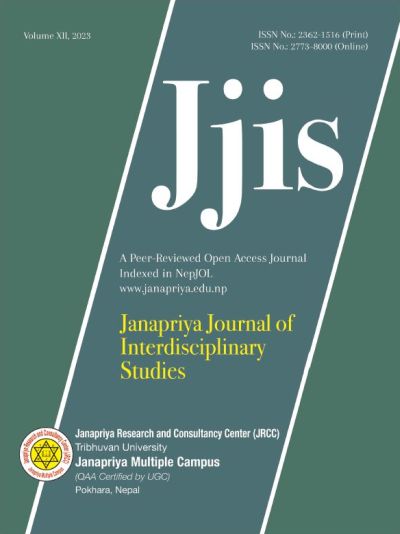Lahure Culture and Educational Achievement in the Gorkha Communities in Pokhara Metropolitan City, Nepal
DOI:
https://doi.org/10.3126/jjis.v12i1.62251Keywords:
Educational attainment process, Gurkha army recruitment process, Gurkha communities, social remittanceAbstract
Nepalese societies have a long history of Gurkha Army culture for centuries. There is no question about the role of this culture in enhancing the socioeconomic status of these communities from the past. However, along with its positive aspects, this trend has brought some possible adverse effects on those communities who are directly or indirectly associated with the Gurkha Army recruitment process. This study has aimed to explain the possible impact on education attainment of youth from these communities due to participation in the Army preparation and selection process. For the study explanatory research methods were used, utilizing both quantitative and qualitative data for insightful investigation of the phenomenon, where 184 aspiring youths from different army training centers operated in Pokhara Metropolitan City, Kaski were selected to gather quantitative insights from young individuals from the Gurkha community actively engaged in Army preparation training. Furthermore, qualitative data was collected through Key Informant Interviews (KIIs) conducted with esteemed principals and administrative figures from educational institutions offering class 11 and 12 courses in Pokhara, Kaski. The recruitment process for the Army, particularly among youths from the Gurkha communities, presents a significant challenge to educational pursuits, resulting in a diversion of focus away from academic endeavors. This trend has led to a substantial number of individuals prioritizing military training over education. Consequently, this phenomenon has adversely affected educational attainment, limiting future opportunities for these communities. Additionally, the Gurkha community’s historical involvement primarily in Gurkha recruitment has perpetuated their societal exclusion and marginalization. While self-realization within the Gurkha community is crucial, effective governmental policies promoting inclusive education and opportunities are equally imperative. Collaborative efforts between communities and policymakers are necessary to bridge these disparities, fostering an equitable environment and integration beyond traditional roles.
Downloads
Downloads
Published
How to Cite
Issue
Section
License
Copyright (c) 2023 The Author(s)

This work is licensed under a Creative Commons Attribution-NonCommercial 4.0 International License.




